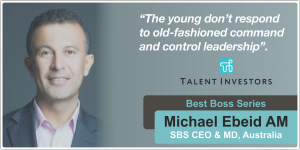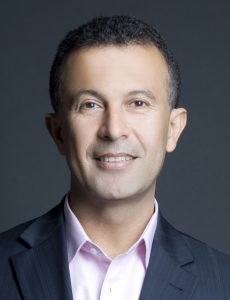Michael Ebeid AM is a strategically focused CEO with more than 30 years’ experience in technology, telecommunications and media sectors. Since being appointed CEO and Managing Director of SBS in 2011, Michael has significantly evolved the public broadcaster’s portfolio, with four distinctive TV channels, an extensive in-language radio offering and market-leading digital services, leveraging its credentials in digital broadcast technology to enable audiences to engage with SBS more than ever before.
Prior to SBS, Michael was Executive Director of Corporate Strategy and Marketing at the ABC, Commercial Operations Director at Optus Communications for 10 years during a significant period of disruption and growth and began his career at IBM, where he held various finance, sales and marketing positions across Australia and Asia. Michael was awarded a Member of the Order of Australia (AM) for his service to Broadcast Media and Multicultural Affairs as an executive, innovator and business leader in 2017 and named CEO of the Year at the 2017 CEO Magazine’s Executive of the Year Awards.
What do you think are the prerequisite qualities of a successful leader.
Authenticity and empathy. In my experience, leaders who make the most impact and are able to build the essential trust needed to make good teams are the leaders that bring their whole selves to work. These are the leaders that are able to be honest about who they are, where they’ve come from and are not afraid to show some vulnerability.
Every leader was once an inexperienced newcomer and it’s always good to remember your own path, with humility.
Good leaders lead by example, they drive business strategy forward by having a clear vision and embodying the values of their organisations. When I started my first graduate job out of university, things like ‘culture’ in the workplace were largely unheard of. It was all about systems and process. The best of leaders today understand the criticality of ensuring a positive team culture where each individual is inspired to do their best work.
When in your career did you find you really began to be an impactful leader and what gave you proof of this?
Actually, I think it was before I entered the workforce. At school and in university I usually found myself being a team leader, of sorts. I found it natural to organise a team, work out who had what skills and how to best deploy them to achieve the goal or desired outcome. I always enjoyed volunteering to lead projects at work. Then turning that into being an impactful leader is when you see team members really excelling and growing in their development. That is really rewarding.
Share with me your greatest leadership success/experience.
It’s hard to select one moment from over a 30-year career. But I can say that in joining SBS, an organisation with such a strong social purpose, and leading its transformation both culturally and digitally into a modern multiplatform media providing insightful, relevant and topical media services has been more humbling than I ever could have imagined. SBS is a true cultural institution which is fulfilling such an important public service in our diverse multicultural society, particularly when you look at the challenges governments globally are facing to integrate diverse communities harmoniously. I’m honoured to be part of its journey.
The growth in audience engagement with SBS hasn’t happened by accident. We’ve invested significant time into an organisational culture program which has delivered major improvements in the employee engagement and in the motivation of our people in coming to work and seeing SBS as a workplace in which they can achieve their goals. This has translated to significant productivity and effectiveness outcomes which are benefiting our biggest stakeholder, the Australian community, which is today able to access the most culturally and linguistically diverse content on their platform and device of choosing, via SBS.
The common opinion states that in order to succeed in business one has to be ruthless. A quick survey of world’s most domineering companies seems to support that view. Do you think it’s possible to be very successful in business and still be a nice/kind person?
I think the world needs more kindness so yes, I absolutely do. I think today being smart, strategic and knowing how to work with partners and stakeholders is more important than being ruthless. I also believe with today’s modern workforce, being inspiring, giving people trust, opportunities and responsibilities is more effective than being a ruthless leader.
The younger generations don’t respond to old-fashioned command and control leadership.
You might expect me to say this but I genuinely believe that the successes we’ve had at SBS in improving employee engagement have come about from instilling a collaborative and respectful style of leadership where anyone at any level can come up with a good idea and effect change.
Let’s talk about managing pressure – how do you control your own emotions and temper when things don’t go to plan? Not lashing out at those around you is a skill – what are your tips?
I have always found that leaders who lose control and can’t control their emotions generally don’t have the respect of their employees. People look to you for guidance when the pressure is on and having a temper means you don’t think clearly. So when the pressure is really on, I work hard to remain the calmest person in the room. That is when you are in control. When your emotions are high, take time out if needed to reset. It’s important to remember to breathe out.
At times, we all hit a low point. How do you motivate yourself?
Low points are natural in every job and of course in life.
I often find going for a walk around the organisation, speaking to colleagues, hearing their challenges and success often inspires me and also helps me to put things into perspective.
There is always someone with a bigger set of obstacles to overcome than you and I think we all do well to remind ourselves of that. I also find walking my dogs Zoe and Ella quickly puts a smile back on my face.
Why is the personal development of the people you manage important to you?
I learnt years ago that life is all one long journey of continual learning. Personal development is essential for people to reach their maximum potential and it can also inspire and motivate you to try new things and be a better person and professional.
Working in an organisation where business culture isn’t people oriented, how do you create an environment where people want to work for you/in your department?
We are very fortunate at SBS because we are a purpose-led organisation and our people are at the very heart of this. When I started on a journey to turn-around the organisational culture of SBS in 2011, one of the things I did was create internal focus groups across the organisation. I mixed the teams up and asked a couple of key questions: “What do you see our culture as today? How does this compare to six years ago? What do you think our culture needs to be for success in the future?” From those things, we could work out what needed to happen to get the culture that we all wanted and this is what has helped us achieve such a successful culture today.
Organisations and leaders should start by asking the people who are living and breathing the culture day-in, day-out – their teams: What is needed in our organisation? Sometimes I think CEOs might be surprised by what they learn and I know I definitely have learned a lot from the people I work with…and I still am!
Companies often refer to themselves as “family”, yet only a few supports their employees like a family supports its members – unconditionally. Aside from professional training, what support do you offer your employees?
Technology is everywhere and increasingly our work lives are blending into our actual lives. We work so closely with our colleagues that it’s inevitable that we get to know each other on a personal level and I think that’s a great thing. In addition to a dedicated professional development hub, at SBS we recognise what’s happening in our lives outside of the office, whether that’s celebrating a birthday, babies or a wedding or when our team members need some additional support. It goes back to feeling able and confident to bring your whole selves to work and recognising that we don’t leave our life at the door when we get into the office, it’s part of who we are and how we work.
Some managers believe in a strict hierarchy and the “do what I say approach”, sighting cultural norm as an excuse. What are your thoughts on this?
Total nonsense.
Most people today hate hierarchy and want to know they can access senior leaders or the CEO if needed. Making myself available is how I have learned more about the organisation and what is really going on.
One of the things I am most proud of at SBS is that we are a lean, agile and relatively flat structure and there’s little hierarchy. Some of the best ideas I’ve had brought to me have been from an employee working in a completely unrelated field but they’ve just happened to have a good idea. Ridding organisations of a hierarchy is essential to creativity and innovation.
Team building has become a buzzword in the corporate world, yet many still do not see the value in applying it to their group or organization. What are your beliefs and or successes around team building?
Seamless working across teams is essential in any organisation and can be the success or failure of any given project. I’ve always been focused on building teams and driving collaboration and it’s something that I continue to champion personally. At SBS, we have a one team approach, which is a journey, not a goal, but it helps to ensure that we’re all on the same page and working to the same end goal putting the company first, not the individual, team or functional area.
In terms of my own executive team, I believe building that camaraderie is essential.
Firstly, building trust and ensuring everyone understands each other’s skill sets and value to the team. Then ensuring as a team we support each other and have cabinet solidarity is critical to instilling confidence in the workforce. We will have our disagreements and challenge each other but once a decision is made we all must stand by it and be united.
How important is leadership training?
Too often companies don’t invest enough in training new managers and assisting experienced managers to develop their skills. Leadership in organisations is often a real problem. We all know employees often resign because of the manager mostly. Employees will quickly detect if their leaders are not walking the talk, not being consistent and not having the difficult conversations when needed. We have invested time and money in developing a purpose-built programme for all people leaders to ensure they can be the best they can, supporting them with tools and skills development and we have seen real improvements across the board in leadership behavioural measures that we track.
I will also personally attend all the courses as well which demonstrates their importance.
When it comes to morning or weekly briefings do you conduct those in person or via a memo?
We have fortnightly Executive meetings in person to ensure that we’re keeping abreast of all the moving parts across the organisation. I also have 1:1s with my direct reports fortnightly. I also host all-staff townhall-style sessions quarterly to ensure employees across the organisation are kept up to date with core activities and movements and have the opportunity to ask me questions and I visit each team regularly. As I mentioned, one the best part of my jobs is walking around the organisation listening to what’s going on.
How much do you value transparency of information at work? To what extent do you share information with your team?
Transparency is absolutely necessary in order to achieve shared organisational goals but it’s important to get a sense of what information needs to be shared and with which individuals or teams in order for people to be able to deliver on their roles. There is, of course, going to be times where information needs to remain confidential as plans and objectives are refined so it’s a balance in ensuring the relevant information is made available at the right time.
How do you best separate work life from personal life – for a healthy balance? What are your biggest challenges around this? How does this impact you personally?
I think most CEO roles are very much 24/7 roles, particularly a media organisation like SBS. I am always available and I’m okay with that.
Ensuring you do things for yourself or for your family every day is important. Whether that be exercise, walks with partners, quiet reading, a swim etc is essential to giving your mind a break to recharge.
Personally, I like to always have holidays or weekend getaways planned so I can look forward to them. The old expression of “you work to live” and not the other way around is important to keep in mind to put things into perspective. People in your organisation might not remember you or your legacy in 15-20 years’ time, but your family will.
Explain how you work with HR for recruiting and interviewing. What works for you and how do you handle the interviewing process for vetting candidates?
We have a decentralised model for recruitment which means the hiring responsibility remains with the Hiring Manager of the particular position. This is important as they are best positioned to determine the most suitable candidate based on the job role and cultural fit. People & Culture at SBS is very much a partner with the business, providing support around best practice recruitment and selection, in addition to guidance on talent sourcing and attraction strategies. The interview process is behaviorally based and we use a selection panel of three, carefully selected to ensure appropriate representation and to avoid potential unconscious bias.
How do you respond to employees/colleagues who are diagnosed with mental disorders, e.g. depression or anxiety?
There is a lot of stigma around mental health issues in the workplace but the approach to treat mental illness is like any other illness. We need to ensure that employees have the appropriate time to care for themselves and that are regular check-ins to confirm they are receiving the support they need and ensuring their job is not adding to the person’s condition. We also offer company sponsored external counselling and assistance. One of our values is that we look out for one another and that means both personally and professionally.
Sometimes an employee is not working out despite your best efforts and you know that this relationship is not serving them or the business. At which point do you decide to part company and how do you go about it?
It’s never easy but the reality is not everyone was meant to work for you or at your organisation or at a particular time. However, it’s all about treating people with respect. We’re clear about our expectations and what’s needed and are honest when it comes to the areas of improvement. If it’s not working and attempts to make improvements are not working, then a genuine and honest conversation is important – encouraging people to make the right decisions for themselves and their careers. Most people know themselves when things aren’t working out and there can be a whole range of reasons for that. It’s important to give people the permission to acknowledge that and then support them in moving on





